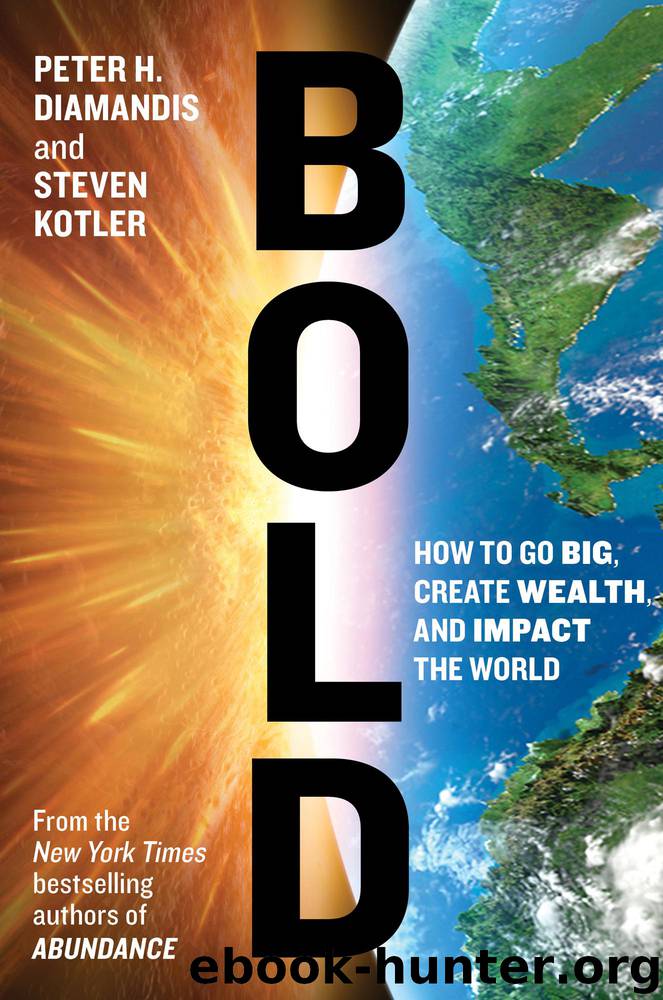Bold: How to Go Big, Create Wealth and Impact the World by Peter H. Diamandis & Steven Kotler

Author:Peter H. Diamandis & Steven Kotler
Language: eng
Format: mobi
Tags: Technology & Engineering, Applied Sciences, Science, Entrepreneurship, Environmental, Social Aspects, General, New Business Enterprises, Business & Economics
ISBN: 9781476709567
Publisher: Simon & Schuster
Published: 2015-02-02T23:00:00+00:00
3. Crowdsourced Testing and Discovery Insights
Insights are invaluable to your business. They can shape the goals and operations of the entire company, dramatically improve and optimize performance, and provide you with counterintuitive ideas or hidden data for a strategic advantage over competitors. When it comes to crowdsourcing insights, there are two main variants: testing and discovery.
Testing-based insights often come from examining existing assumptions and current best practices. These include surveys, A/B testing, representative sampling, customer feedback, case study abstractions, and focus groups, among others. When running a test, focus on asking one specific question and using the data or resources at your disposal to frame the question appropriately.
For example, if you are in the world of software development, you know that testing your wares can be incredibly tedious, difficult, and time-consuming. There is no room for error, so you have to have as many people as possible hunting for bugs before launch. No problem. uTest (www.utest.com) provides a massive community of “professional testers” who run functional, usability, localization, load, and security tests on your code. By leveraging the crowd and data from previous tests, they optimize and simplify the process, making it less expensive, while offering reduced churn rates, better functionality, and quicker time to market.
Creatives are also getting in on the insight game. Take ReverbNation (www.reverbnation.com), a music distribution, publishing, and crowdsourced testing platform. Say you’re an aspiring musician. You’ve produced a few songs, but before spending money on paid advertising or management, you want to see whether anyone actually likes your music. Now you can have songs rated and reviewed long before you actually go to market.
The other side of this insight equation is the crowdsourcing of discovery-based insights. This can mean a few things. You can ask the crowd for their interpretation of a particular problem or question. For example, Genius asks the crowd to annotate song lyrics. Kaggle outlines a problem that its community solves with original algorithms. Or perhaps more simply, you can provide a platform for the crowd to come up with their own ideas and inventions, as Quirky does with its invention network and Threadless does with its T-shirt design competitions.
Discovery-based insights can be as simple as asking the crowd for answers and paying attention as the best solutions, designs, and inventions bubble their way to the top. As a personal example, in the spring of 2014, in preparation for rereleasing Abundance as a paperback, I asked the crowd to help me discover new evidence of abundance that I could include in the appendix. People emailed me their data, charts, and graphics to [email protected] (new submissions are always welcome). The response was extraordinary and yielded considerable evidence of our continued forward progress.
So there you have a top-level overview of the crowdsourcing space. Since this is an area that will change rapidly as new players enter and new AI capabilities come online, I wanted to point you to a few industry websites worth visiting that will keep the taxonomy fresh and up-to-date.
AbundanceHub.com: This is
Download
This site does not store any files on its server. We only index and link to content provided by other sites. Please contact the content providers to delete copyright contents if any and email us, we'll remove relevant links or contents immediately.
International Integration of the Brazilian Economy by Elias C. Grivoyannis(110220)
The Radium Girls by Kate Moore(12018)
Turbulence by E. J. Noyes(8040)
Nudge - Improving Decisions about Health, Wealth, and Happiness by Thaler Sunstein(7693)
The Black Swan by Nassim Nicholas Taleb(7109)
Rich Dad Poor Dad by Robert T. Kiyosaki(6612)
Pioneering Portfolio Management by David F. Swensen(6289)
Man-made Catastrophes and Risk Information Concealment by Dmitry Chernov & Didier Sornette(6007)
Zero to One by Peter Thiel(5787)
Secrecy World by Jake Bernstein(4741)
Millionaire: The Philanderer, Gambler, and Duelist Who Invented Modern Finance by Janet Gleeson(4468)
The Age of Surveillance Capitalism by Shoshana Zuboff(4277)
Skin in the Game by Nassim Nicholas Taleb(4239)
The Money Culture by Michael Lewis(4198)
Bullshit Jobs by David Graeber(4179)
Skin in the Game: Hidden Asymmetries in Daily Life by Nassim Nicholas Taleb(3991)
The Dhandho Investor by Mohnish Pabrai(3759)
The Wisdom of Finance by Mihir Desai(3735)
Blockchain Basics by Daniel Drescher(3574)
